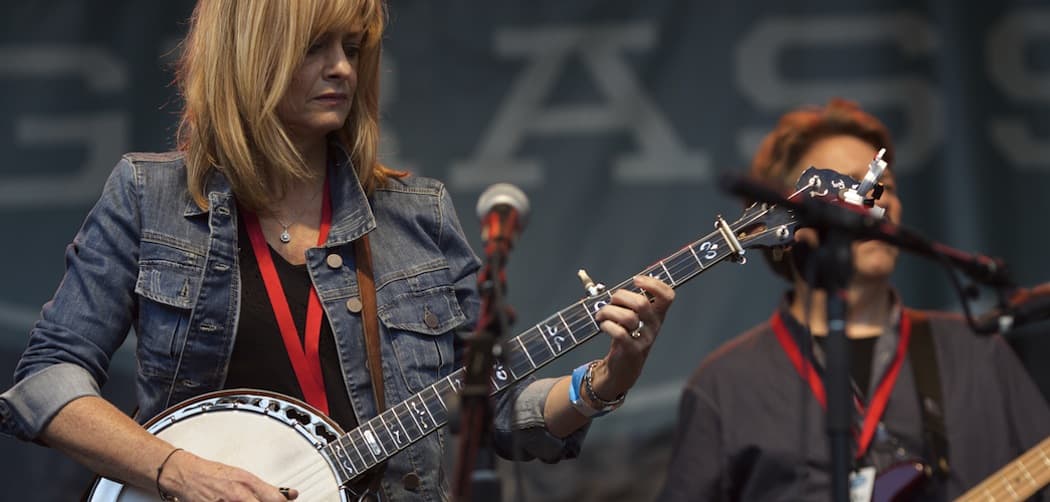Advertisement
In An Unlikely Locale, FreshGrass Grows

The mix of repurposed factory buildings and bleeding-edge artwork found at the insistently hip Massachusetts Museum of Contemporary Art (Mass MoCA) in downtown North Adams doesn't really scream out the word "bluegrass."
But this institution, where the longtime instinct when it comes to live music has been for heady trendsetters like Laurie Anderson and the New York City new-music collective Bang on a Can, has quietly built up the little bluegrass festival that could.
FreshGrass enters its fifth year this weekend, with performances beginning Friday evening and running through Sunday. From the acumen shown in booking leading lights of the scene — this year including progressive pickers Punch Brothers, country star Dwight Yoakam and the time-tested Del McCoury Band — to its possibly industry-leading $25,000 prize purse, FreshGrass has grown from a hastily conceived experiment into a leading roots-music festival of the region.
Alison Brown, the banjo player, bandleader and founder of Nashville-based Compass Records, says the museum context makes perfect sense for an artist roster including "super trad" bluegrass practitioners like McCoury (who honed his chops playing in the band of bluegrass pioneer Bill Monroe himself) as well as bands pushing the frontiers of American acoustic music.
"When you're in a space that's kind of challenging you intellectually, I think it's great to challenge people with this question as well: What is roots music in 2015? What is bluegrass today? It's certainly a far cry from the agrarian music that Bill Monroe created in 1945. But it's just as vital," Brown says in a phone interview, "and the spirit of innovation has always been at the core of bluegrass music. It's great to have a festival that's challenging those notions but not saying it out loud."
This year's program also includes a tribute to Johnny Cash, a late-night set by Leftover Salmon, live scores to silent films played by festival acts and the all-star trio of Sara Watkins, Sarah Jarosz and Aoife O'Donovan.
Mass MoCA director Joe Thompson says the festival can be traced back to the kernel of a weekly acoustic jam in the museum’s lobby. When the museum held the first FreshGrass festival in 2011, it had hosted the second iteration of Wilco’s Solid Sound festival just a few months before, and the institution’s leaders were encouraged by the results. With the continued growth of both events, music festivals have become an ever-more-important piece of the museum’s annual programming.
“As long as it's all top-notch," Thompson says, "I like being thought of as a place that is welcoming of a wide range of musical styles. We're a contemporary art museum in North Adams, after all. We've always been a bit honky-tonk."
For FreshGrass, Mass MoCA combines the work of its in-house curatorial staff with that of producer Chris Wadsworth. Last year, the festival took ownership of “No Depression,” the online publication (formerly an in-print magazine) covering the roots music scene.
Advertisement
For the first time, that aforementioned prize money will be split among four performance contests this year, pitting together emerging players in the categories of banjo, fiddle, duo and group. There are also workshops led by Brown, Happy Traum, Boston-based fiddle hero Darol Anger and other faculty members of the Berklee School of Music's American Roots Music Program. The Berklee presence has been a regular one at the festival — whether seen in Anger popping up for miscellaneous guest appearances onstage or roots-music program head Matt Glaser dissecting the song form of "The Sailor's Hornpipe" in a meeting room.
Brown, who emerged on the scene as an original member of Alison Krauss's band Union Station — after her undergrad studies at Harvard University, followed by an MBA earned at UCLA, led first to work as an investment banker — has a quasi-official role at FreshGrass, as a perennial performer and contest judge and through a partnership with Compass, which staffs and runs the festival's on-site artist merchandise operation.
She'll lead her quartet on Saturday, after accompanying D.W. Griffith’s 1910 short film “A Child of the Ghetto” with a live banjo score on Friday. (She’ll return to Massachusetts to play the Iron Horse Music Hall in Northampton on Oct. 8 and the First Parish Church in Cambridge the following day.)
Her label mogul duties have occupied much of her time since her last album, released in 2009, but this weekend she'll be previewing a new release, "The Song of the Banjo," due in October. A deliberate crossover effort, it includes original tunes interspersed with banjo-led covers of pop hits like "Time After Time" and "What’s Going On," and guest spots from Indigo Girls and Keb’ Mo’.
"One of my objectives was to really show the instrument's lyrical side," she says, "and my other objective was to create a banjo record for people who've never discovered the instrument, or think it's just the soundtrack to bank robbers or high-speed chases… When you play a familiar melody, it’s a lot easier for people who aren’t familiar with the instrument to get what’s happening.”
Festival organizers hope that FreshGrass will again prove similarly appealing to newbies and to old hands alike.
Jeremy D. Goodwin contributes regularly to The Boston Globe, The ARTery (where he is also an editor), Berkshire Magazine and many other publications. See more of his work here. Follow him on Twitter here.


